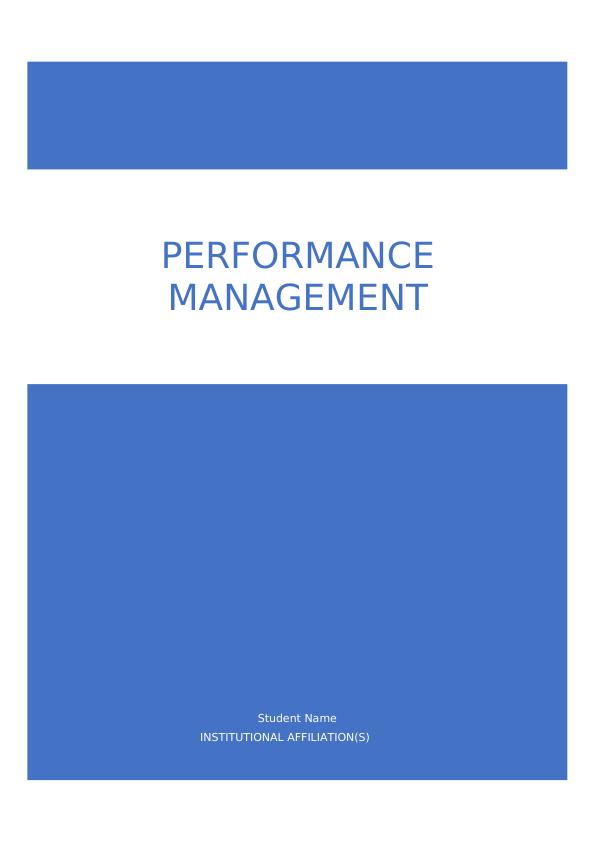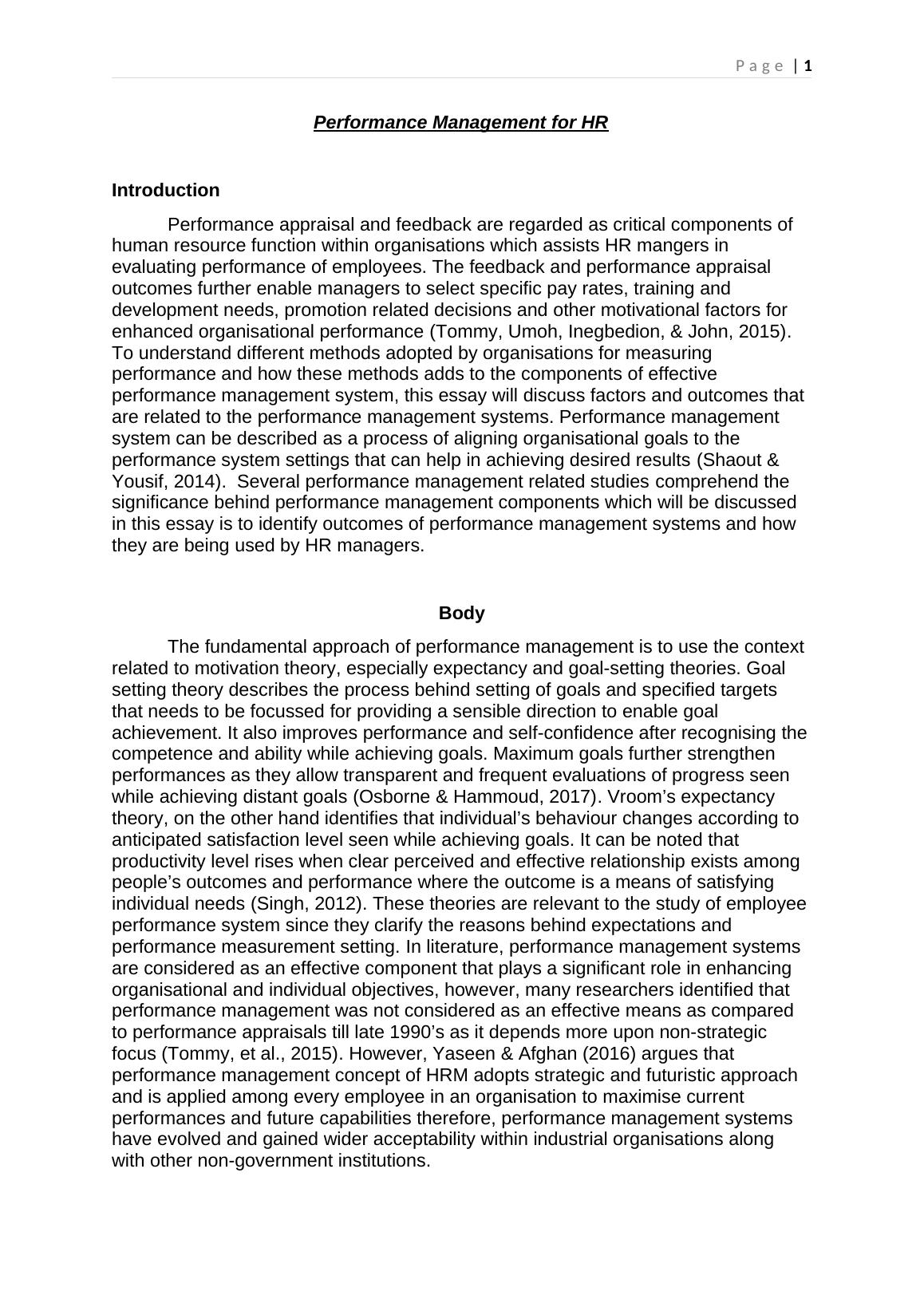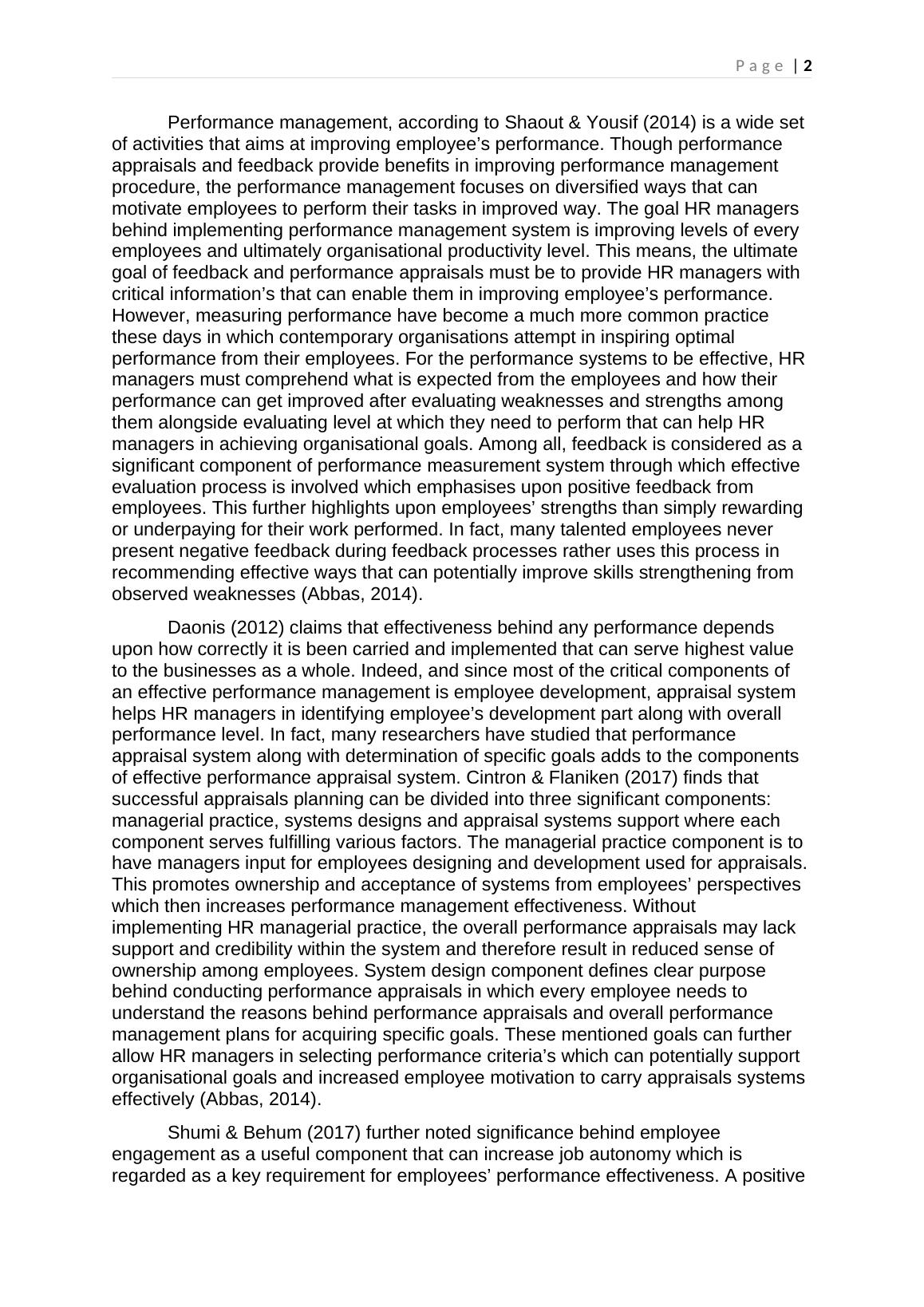Performance Management for HR
6 Pages2088 Words366 Views
Added on 2022-12-15
About This Document
This essay discusses the factors and outcomes related to performance management systems in HR. It explores different methods for measuring performance and how they contribute to effective performance management.
Performance Management for HR
Added on 2022-12-15
ShareRelated Documents
Student Name
INSTITUTIONAL AFFILIATION(S)
PERFORMANCE
MANAGEMENT
INSTITUTIONAL AFFILIATION(S)
PERFORMANCE
MANAGEMENT

P a g e | 1
Performance Management for HR
Introduction
Performance appraisal and feedback are regarded as critical components of
human resource function within organisations which assists HR mangers in
evaluating performance of employees. The feedback and performance appraisal
outcomes further enable managers to select specific pay rates, training and
development needs, promotion related decisions and other motivational factors for
enhanced organisational performance (Tommy, Umoh, Inegbedion, & John, 2015).
To understand different methods adopted by organisations for measuring
performance and how these methods adds to the components of effective
performance management system, this essay will discuss factors and outcomes that
are related to the performance management systems. Performance management
system can be described as a process of aligning organisational goals to the
performance system settings that can help in achieving desired results (Shaout &
Yousif, 2014). Several performance management related studies comprehend the
significance behind performance management components which will be discussed
in this essay is to identify outcomes of performance management systems and how
they are being used by HR managers.
Body
The fundamental approach of performance management is to use the context
related to motivation theory, especially expectancy and goal-setting theories. Goal
setting theory describes the process behind setting of goals and specified targets
that needs to be focussed for providing a sensible direction to enable goal
achievement. It also improves performance and self-confidence after recognising the
competence and ability while achieving goals. Maximum goals further strengthen
performances as they allow transparent and frequent evaluations of progress seen
while achieving distant goals (Osborne & Hammoud, 2017). Vroom’s expectancy
theory, on the other hand identifies that individual’s behaviour changes according to
anticipated satisfaction level seen while achieving goals. It can be noted that
productivity level rises when clear perceived and effective relationship exists among
people’s outcomes and performance where the outcome is a means of satisfying
individual needs (Singh, 2012). These theories are relevant to the study of employee
performance system since they clarify the reasons behind expectations and
performance measurement setting. In literature, performance management systems
are considered as an effective component that plays a significant role in enhancing
organisational and individual objectives, however, many researchers identified that
performance management was not considered as an effective means as compared
to performance appraisals till late 1990’s as it depends more upon non-strategic
focus (Tommy, et al., 2015). However, Yaseen & Afghan (2016) argues that
performance management concept of HRM adopts strategic and futuristic approach
and is applied among every employee in an organisation to maximise current
performances and future capabilities therefore, performance management systems
have evolved and gained wider acceptability within industrial organisations along
with other non-government institutions.
Performance Management for HR
Introduction
Performance appraisal and feedback are regarded as critical components of
human resource function within organisations which assists HR mangers in
evaluating performance of employees. The feedback and performance appraisal
outcomes further enable managers to select specific pay rates, training and
development needs, promotion related decisions and other motivational factors for
enhanced organisational performance (Tommy, Umoh, Inegbedion, & John, 2015).
To understand different methods adopted by organisations for measuring
performance and how these methods adds to the components of effective
performance management system, this essay will discuss factors and outcomes that
are related to the performance management systems. Performance management
system can be described as a process of aligning organisational goals to the
performance system settings that can help in achieving desired results (Shaout &
Yousif, 2014). Several performance management related studies comprehend the
significance behind performance management components which will be discussed
in this essay is to identify outcomes of performance management systems and how
they are being used by HR managers.
Body
The fundamental approach of performance management is to use the context
related to motivation theory, especially expectancy and goal-setting theories. Goal
setting theory describes the process behind setting of goals and specified targets
that needs to be focussed for providing a sensible direction to enable goal
achievement. It also improves performance and self-confidence after recognising the
competence and ability while achieving goals. Maximum goals further strengthen
performances as they allow transparent and frequent evaluations of progress seen
while achieving distant goals (Osborne & Hammoud, 2017). Vroom’s expectancy
theory, on the other hand identifies that individual’s behaviour changes according to
anticipated satisfaction level seen while achieving goals. It can be noted that
productivity level rises when clear perceived and effective relationship exists among
people’s outcomes and performance where the outcome is a means of satisfying
individual needs (Singh, 2012). These theories are relevant to the study of employee
performance system since they clarify the reasons behind expectations and
performance measurement setting. In literature, performance management systems
are considered as an effective component that plays a significant role in enhancing
organisational and individual objectives, however, many researchers identified that
performance management was not considered as an effective means as compared
to performance appraisals till late 1990’s as it depends more upon non-strategic
focus (Tommy, et al., 2015). However, Yaseen & Afghan (2016) argues that
performance management concept of HRM adopts strategic and futuristic approach
and is applied among every employee in an organisation to maximise current
performances and future capabilities therefore, performance management systems
have evolved and gained wider acceptability within industrial organisations along
with other non-government institutions.

P a g e | 2
Performance management, according to Shaout & Yousif (2014) is a wide set
of activities that aims at improving employee’s performance. Though performance
appraisals and feedback provide benefits in improving performance management
procedure, the performance management focuses on diversified ways that can
motivate employees to perform their tasks in improved way. The goal HR managers
behind implementing performance management system is improving levels of every
employees and ultimately organisational productivity level. This means, the ultimate
goal of feedback and performance appraisals must be to provide HR managers with
critical information’s that can enable them in improving employee’s performance.
However, measuring performance have become a much more common practice
these days in which contemporary organisations attempt in inspiring optimal
performance from their employees. For the performance systems to be effective, HR
managers must comprehend what is expected from the employees and how their
performance can get improved after evaluating weaknesses and strengths among
them alongside evaluating level at which they need to perform that can help HR
managers in achieving organisational goals. Among all, feedback is considered as a
significant component of performance measurement system through which effective
evaluation process is involved which emphasises upon positive feedback from
employees. This further highlights upon employees’ strengths than simply rewarding
or underpaying for their work performed. In fact, many talented employees never
present negative feedback during feedback processes rather uses this process in
recommending effective ways that can potentially improve skills strengthening from
observed weaknesses (Abbas, 2014).
Daonis (2012) claims that effectiveness behind any performance depends
upon how correctly it is been carried and implemented that can serve highest value
to the businesses as a whole. Indeed, and since most of the critical components of
an effective performance management is employee development, appraisal system
helps HR managers in identifying employee’s development part along with overall
performance level. In fact, many researchers have studied that performance
appraisal system along with determination of specific goals adds to the components
of effective performance appraisal system. Cintron & Flaniken (2017) finds that
successful appraisals planning can be divided into three significant components:
managerial practice, systems designs and appraisal systems support where each
component serves fulfilling various factors. The managerial practice component is to
have managers input for employees designing and development used for appraisals.
This promotes ownership and acceptance of systems from employees’ perspectives
which then increases performance management effectiveness. Without
implementing HR managerial practice, the overall performance appraisals may lack
support and credibility within the system and therefore result in reduced sense of
ownership among employees. System design component defines clear purpose
behind conducting performance appraisals in which every employee needs to
understand the reasons behind performance appraisals and overall performance
management plans for acquiring specific goals. These mentioned goals can further
allow HR managers in selecting performance criteria’s which can potentially support
organisational goals and increased employee motivation to carry appraisals systems
effectively (Abbas, 2014).
Shumi & Behum (2017) further noted significance behind employee
engagement as a useful component that can increase job autonomy which is
regarded as a key requirement for employees’ performance effectiveness. A positive
Performance management, according to Shaout & Yousif (2014) is a wide set
of activities that aims at improving employee’s performance. Though performance
appraisals and feedback provide benefits in improving performance management
procedure, the performance management focuses on diversified ways that can
motivate employees to perform their tasks in improved way. The goal HR managers
behind implementing performance management system is improving levels of every
employees and ultimately organisational productivity level. This means, the ultimate
goal of feedback and performance appraisals must be to provide HR managers with
critical information’s that can enable them in improving employee’s performance.
However, measuring performance have become a much more common practice
these days in which contemporary organisations attempt in inspiring optimal
performance from their employees. For the performance systems to be effective, HR
managers must comprehend what is expected from the employees and how their
performance can get improved after evaluating weaknesses and strengths among
them alongside evaluating level at which they need to perform that can help HR
managers in achieving organisational goals. Among all, feedback is considered as a
significant component of performance measurement system through which effective
evaluation process is involved which emphasises upon positive feedback from
employees. This further highlights upon employees’ strengths than simply rewarding
or underpaying for their work performed. In fact, many talented employees never
present negative feedback during feedback processes rather uses this process in
recommending effective ways that can potentially improve skills strengthening from
observed weaknesses (Abbas, 2014).
Daonis (2012) claims that effectiveness behind any performance depends
upon how correctly it is been carried and implemented that can serve highest value
to the businesses as a whole. Indeed, and since most of the critical components of
an effective performance management is employee development, appraisal system
helps HR managers in identifying employee’s development part along with overall
performance level. In fact, many researchers have studied that performance
appraisal system along with determination of specific goals adds to the components
of effective performance appraisal system. Cintron & Flaniken (2017) finds that
successful appraisals planning can be divided into three significant components:
managerial practice, systems designs and appraisal systems support where each
component serves fulfilling various factors. The managerial practice component is to
have managers input for employees designing and development used for appraisals.
This promotes ownership and acceptance of systems from employees’ perspectives
which then increases performance management effectiveness. Without
implementing HR managerial practice, the overall performance appraisals may lack
support and credibility within the system and therefore result in reduced sense of
ownership among employees. System design component defines clear purpose
behind conducting performance appraisals in which every employee needs to
understand the reasons behind performance appraisals and overall performance
management plans for acquiring specific goals. These mentioned goals can further
allow HR managers in selecting performance criteria’s which can potentially support
organisational goals and increased employee motivation to carry appraisals systems
effectively (Abbas, 2014).
Shumi & Behum (2017) further noted significance behind employee
engagement as a useful component that can increase job autonomy which is
regarded as a key requirement for employees’ performance effectiveness. A positive

End of preview
Want to access all the pages? Upload your documents or become a member.
Related Documents
The Role of Rewards in Performance Managementlg...
|5
|994
|131
Process Of Effectively Utilizing The Human Resourcelg...
|9
|2853
|9
Performance Management for HRlg...
|7
|2054
|23
Essay on Performance Managementlg...
|8
|2202
|57
Performance Management of HRlg...
|6
|1814
|26
Performance Management Theory 2022lg...
|7
|2204
|19
